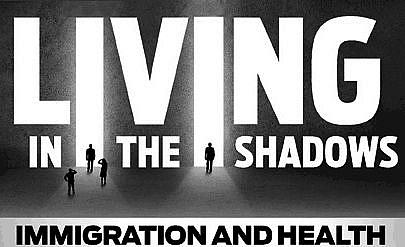Living in the Shadows: Link between immigration and health hinges on specifics

Sifting through the scientific literature on immigration and health makes one thing clear above all else: the health of immigrants is very much shaped by the particulars of their background.
We recognized this in approaching the new Living in the Shadows series. So we decided not to write about immigrants as if they were one uniform group, as often happens in policy debates and in the comment sections of news outlets. Immigrants arrive here with vastly different experiences from each other – and from their new neighbors. Repeated studies show that those experiences tie directly to their health experiences.
Refugees who have suffered from violence have higher rates of depression and anxiety. South Asian immigrants are more likely to have coronary artery disease then Caucasians. African immigrants are among the least likely communities to have high blood pressure. And, before you start to write that immigrants always have it worse off than the high-income Americans who live all around them, note that the children of immigrants have lower rates of asthma, attention deficit disorder, and learning disabilities.
As these children grow up in the United States, the new environment can have both a positive and negative impact, depending on their situation. In fact, there are a host of studies that show the positive attributes of being an immigrant, so much so that researchers often refer to “the healthy immigrant effect.” Although this phenomenon seems to have diminishing returns the longer that people stay in the U.S. -- fifteen years in, health deteriorates for many immigrants. These findings have been particularly true for mental health disorders.
In the Living in the Shadows series, news organizations from around the country are attempting to explore the relationship between immigration and health by describing the particulars of these different immigrant experiences.
This Monday, Erika Beras at WESA 90.5 in Pittsburgh told us the story of Claudine Mukankindi, a Congolese refugee who started out with a promising life here but ended up descending into mental health problems and dying at a very young age.
The ongoing effects of trauma in countries that have seen drawn out civil wars, such as the Congo, genocides or other violence are well documented in the medical literature. Beras referred to a 2010 study in JAMA by Lynn Lawry from Harvard Medical School. That study, Association of Sexual Violence and Human Rights Violations With Physical and Mental Health in Territories of the Eastern Democratic Republic of the Congo, found:
- Of the 1,005 households surveyed, 998 households participated, yielding a response rate of 98.9%.
- Rates of reported sexual violence were 39.7% among women and 23.6% among men.
- Rates of conflict-related human rights abuses were 67%.
- Rates of symptoms for major depressive disorder symptoms were 41%.
- Rates of symptoms of post-traumatic stress disorder were 50.1%.
Beras noted in her story that the PTSD rate was stunningly high: “In contrast, that number is between 5 to 10 percent of the U.S. population.”
On Thursday, Johanes Rosello at Mundo Hispánico in Atlanta told us about the Barajas family and other families who have lost a parent to deportation. And later in the series we will get to meet the grown children of parents who have been deported, immigrants locked up in private detention centers and others with their own experiences.
As the series progresses, we will write in this blog about the science exploring links between immigration and health and share what goes on behind the scenes. Some of the research findings that emerged in our reporting have certainly been a surprise to me, and I am eager to hear your thoughts, too.
You can write as at immigranthealth@reportingonhealth.org. Follow the series on Twitter @immighealth and learn more about it on Facebook.
Related Stories
Trauma haunted a woman who saw too much

